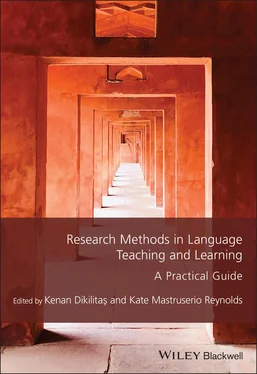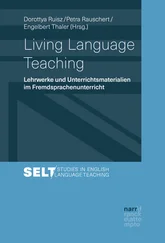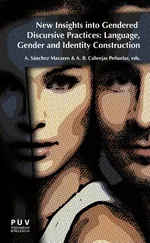Research Methods in Language Teaching and Learning
Здесь есть возможность читать онлайн «Research Methods in Language Teaching and Learning» — ознакомительный отрывок электронной книги совершенно бесплатно, а после прочтения отрывка купить полную версию. В некоторых случаях можно слушать аудио, скачать через торрент в формате fb2 и присутствует краткое содержание. Жанр: unrecognised, на английском языке. Описание произведения, (предисловие) а так же отзывы посетителей доступны на портале библиотеки ЛибКат.
- Название:Research Methods in Language Teaching and Learning
- Автор:
- Жанр:
- Год:неизвестен
- ISBN:нет данных
- Рейтинг книги:5 / 5. Голосов: 1
-
Избранное:Добавить в избранное
- Отзывы:
-
Ваша оценка:
- 100
- 1
- 2
- 3
- 4
- 5
Research Methods in Language Teaching and Learning: краткое содержание, описание и аннотация
Предлагаем к чтению аннотацию, описание, краткое содержание или предисловие (зависит от того, что написал сам автор книги «Research Methods in Language Teaching and Learning»). Если вы не нашли необходимую информацию о книге — напишите в комментариях, мы постараемся отыскать её.
Research Methods in Language Teaching and Learning
Research Methods in Language Teaching and Learning
Research Methods in Language Teaching and Learning — читать онлайн ознакомительный отрывок
Ниже представлен текст книги, разбитый по страницам. Система сохранения места последней прочитанной страницы, позволяет с удобством читать онлайн бесплатно книгу «Research Methods in Language Teaching and Learning», без необходимости каждый раз заново искать на чём Вы остановились. Поставьте закладку, и сможете в любой момент перейти на страницу, на которой закончили чтение.
Интервал:
Закладка:
Glaser (2007) posits that grounded theory is used interchangeably with qualitative content analysis in many research studies. However, grounded theory is more than just qualitative analysis. Glaser and Holton (2004) identified several differences between grounded theory and qualitative descriptive analysis in a detailed way. Accordingly, grounded theory analysis is not descriptive: it does not yield an in-depth understanding of the phenomena but “produces a substantive, conceptual theory with general implications” (p. xx). This allows the researcher to bridge the gap between theory and practice, because relationships between concepts of data are identified without any preconceived categories or codes (Grix, 2004). As a result, from a grounded theory perspective, qualitative data is not seen as an objective that researchers want to achieve to understand a situation, but rather as evidence which leads researchers to generate a theory.
In the literature, there are different methodological alternatives that guide researchers in implementing grounded theory. Considering that qualitative research is context-dependent, each research may require following different processes. For that reason, researchers can adapt grounded theory methodologies to their research contexts. The procedures we followed in this research are in line with the essential grounded theory methods proposed by Birks and Mills (2015).
In this research, I coded and categorized the qualitative data to detect important issues relevant to my research questions. The data collection and analysis processes were iterative, in that I analyzed the questionnaire data before conducting follow-up interviews, so that I could ask interviewees to elaborate on some significant data collected through the questionnaires. In addition, I analyzed the data collected from student participants before conducting interviews with the teacher, so that we were able to exchange ideas on the data provided by the students.
I recorded my personal views throughout the research using the field notes that I made during observations. This enabled me to recall issues that I found significant in different phases of the research and to use these to collect further data and generate a theory. With regard to theoretical sampling, I used purposive sampling and collected data from students with different characteristics, so that I could understand the situation from varied points of view. Throughout the study, I constantly compared different types of data (i.e., qualitative and quantitative) collected through different data collection methods (i.e., observation, interview, and questionnaire). This allowed me to check whether these findings confirmed each other and to identify core categories and sub-categories.
Regarding theoretical sensitivity, I used my knowledge of student negotiation and my memos. This was also useful for generating a further understanding of the categories that emerged from the data. In intermediate coding, I attempted to make connections between categories. For example, participants reported that they learned how to use circumlocution as a communication strategy. This category was then linked with “fluency”, because later on participants reported that using circumlocution helped them speak more fluently. These processes led to the identification of a core category, which was increased classroom participation. In explaining our core category, increased classroom participation, we referred to relevant categories and the literature based on these categories. These procedures enabled me to generate theoretical hypotheses.
The Findings of the Study and How These Findings Have Been Shared
This study revealed some innovative findings by shedding light on an unexplored area – the outcomes of implementing student negotiation in EFL speaking classes. This gap in the literature allowed me to follow grounded theory to generate hypotheses based on the data. Despite the lack of evidence on student-negotiated speaking classes, the existing literature provides ample insight into the factors influencing the effectiveness of these classes. It is agreed that student engagement is very important and students’ attitudes and perceived speaking abilities are among factors that determine whether students will be engaged in an activity or not. We referred to these assumptions in generating our hypotheses. One of the hypotheses was that student negotiation increases student engagement in speaking activities. The findings showed that negotiating the course content with students led to the development of more positive attitudes towards speaking, perceived speaking ability, and greater willingness to communicate. Considering these, it is clear that the hypotheses were generated based on the data, but we addressed the existing literature in identifying important findings that contribute to our knowledge.
To increase the possible contribution of this study to the ELT field, my doctoral supervisors and I hoped to publish articles in well-known journals, so that the results of our research would be available to many readers. However, it was difficult to report all stages of the study in one article. Therefore, we decided to write two articles – one focusing on Stage 2 and the other focusing on Stages 1 and 3. While the former addressed the findings of the research interventions, the latter presented the findings of the data collected before and after these interventions. In the first article (see Uztosun et al., 2014), we described the processes of eight weekly-based interventions, in which student negotiation was implemented, and reported structural (e.g., teacher’s roles, the level of control) and affective factors (e.g., being interesting, competitive, and feeling comfortable) that are likely to influence the effectiveness of EFL speaking classes.
The second article (see Uztosun et al., 2017) reported how student negotiation promoted student engagement, perceived speaking ability and willingness to communicate. After revisions which focused on the theoretical framework of the study and difficulties of showing the effectiveness of student negotiation in improving student negotiation, the article was published on 20 January 2017.
My preoccupation with providing empirical evidence on teaching and learning EFL speaking continued after my doctoral studies. I published an article describing the characteristics of pre-service teachers of EFL across Turkey in terms of language learning background (see Uztosun, 2017a), in which I commented on how many future teachers of English entered universities with limited language learning experience as this focused solely on grammar, vocabulary, and reading. The participants reported feeling least proficient in listening, speaking, and vocabulary. These findings provided support for the assumption that teaching speaking and listening is a major issue in EFL teacher education. This study encouraged me to investigate in-service EFL teachers’ views on the quality of ELT in Turkey, since I wanted to uncover problems that hinder the effectiveness of the ELT provided in state schools. The analysis of the data collected from a large group of participants (N = 2,476) showed that shifting the focus of ELT in Turkey to teaching listening and speaking could help to deal with some of the instructional problems that teachers reported encountering in teaching EFL (see Uztosun, 2018). In reviewing the literature related to teaching and learning EFL, I have found the term “student negotiation” to be of great interest as it seems to be highly relevant to improving EFL speaking skills. As a result, I developed a scale which I called the “self-regulated motivation for improving speaking English as a foreign language” (SRMIS-EFL) to measure the self-regulated speaking motivations of EFL learners (see Uztosun, 2017b). This is the only scale that measures self-regulated speaking motivation. Recently, I have conducted studies to test whether self-regulated speaking motivation is related to the development of EFL speaking skills. Considering the studies that I have conducted so far, it is clear that my doctoral research study increased my interest in teaching and learning speaking EFL.
Читать дальшеИнтервал:
Закладка:
Похожие книги на «Research Methods in Language Teaching and Learning»
Представляем Вашему вниманию похожие книги на «Research Methods in Language Teaching and Learning» списком для выбора. Мы отобрали схожую по названию и смыслу литературу в надежде предоставить читателям больше вариантов отыскать новые, интересные, ещё непрочитанные произведения.
Обсуждение, отзывы о книге «Research Methods in Language Teaching and Learning» и просто собственные мнения читателей. Оставьте ваши комментарии, напишите, что Вы думаете о произведении, его смысле или главных героях. Укажите что конкретно понравилось, а что нет, и почему Вы так считаете.












